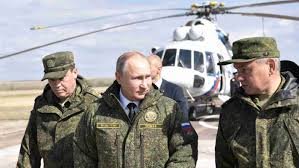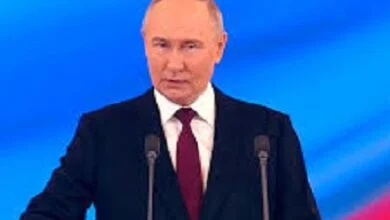Russia may be switching sides in the Sudanese civil war !!!
Editorial :- S K Singh: Editor-in-Chief

WAR-REPORT:- Reflexive control is a key element of Russia’s hybrid warfare toolkit — it is a tactic that relies on shaping an adversary with targeted rhetoric and information operations in such a way that the adversary voluntarily takes actions that are advantageous to Russia. Soviet mathematician Vladimir Lefebvre defined reflexive control as “the process of transferring the reasons of making a decision” to an adversary via “provocations, intrigues, disguises, creation of false objects, and lies of any type.”

Russia has frequently used nuclear saber-rattling throughout the course of its full-scale invasion of Ukraine to cause the West (Russia’s self-defined adversary) to stop providing military support for Ukraine, and this nuclear saber-rattling has become a frequently used form of Russian reflexive control.
The Russian Ministry of Defense (MoD) reported on May 6 that Russian President Vladimir Putin instructed the Russian General Staff to prepare to conduct non-strategic (tactical) nuclear weapons exercises to “practice the preparation and use” of tactical nuclear weapons. The Russian MoD stated that these exercises will involve missile formations of Russia’s Southern Military District (SMD) as well as Russian aviation and naval forces.

The Russian MoD and the Russian Ministry of Foreign Affairs (MFA) both notably claimed that Russia will conduct nuclear exercises in response to “provocative statements and threats” made by Western officials against Russia. The Russian MFA accused the US of deploying ground-based intermediate and short-range missiles “in various regions around the world,” which the Russian MFA claimed allows Russia to reciprocate in kind.

The Russian MFA also claimed that it will consider the arrival of F-16s to Ukraine as a provocation because Russia will consider F-16s carriers of nuclear weapons, a boilerplate threat that Russian officials have been making since Western states first committed to sending F-16s to Ukraine in summer 2023.
Russian Security Council Deputy Chairperson Dmitry Medvedev accused US, French, and British officials of considering sending their troops to Ukraine and claimed that this justifies Russia testing its tactical nuclear weapons. Medvedev also directly threatened a “world catastrophe” as a result of Western involvement in Ukraine and warned of Russian strikes against Washington, Paris, and London.

Russian officials, particularly Medvedev, are critical elements of Russia’s efforts to use nuclear rhetoric as a form of reflexive control, as ISW has frequently reported. Russian officials consistently time nuclear readiness exercises and vague threats of nuclear retaliation with important Western policy decisions regarding the war in Ukraine to force Western decision-makers to self-deter and temper their support for Ukraine.
The current apparent resurgence of nuclear rhetoric, this time in the form of planned tactical nuclear weapons exercises, coincides with the imminent arrival of Western weapons in Ukraine. Russian officials are likely using the nuclear weapons information operation to discourage Ukraine’s Western partners from providing additional military support and to scare Western decision-makers out of allowing Ukrainian forces to use Western-provided systems to attack legitimate military targets in Russia.

Russian troops engage in routine nuclear exercises as part of this wider nuclear rhetoric information operation, but ISW continues to assess that Russia is highly unlikely to use a tactical nuclear weapon on the battlefield in Ukraine or anywhere else.
Key Takeaways
- The Kremlin appears to be re-intensifying a reflexive control campaign targeting Western decision-making using nuclear threats and diplomatic manipulation.
- Russian elites and Kremlin officials are reportedly vying for influential positions in the Russian government ahead of the Russian presidential inauguration on May 7 to prematurely secure powerful roles in the event that Russian President Vladimir Putin leaves power around the end of his new term.
- A Russian insider source, who has routinely been accurate about past Russian military command changes, claimed that the Russian military command appointed the commanders and chiefs of staff of the newly formed Leningrad and Moscow military districts (LMD and MMD).

- The Kremlin continues tightening the restrictions on individuals it designates as “foreign agents,” restricting their ability to serve in government roles, likely in a disguised purge of officials who do not adequately align with the Kremlin.
- Ukraine’s Main Military Intelligence Directorate (GUR) conducted a successful maritime drone strike against a Russian patrol boat in occupied Crimea on May 6, and Ukrainian forces are reportedly adapting their maritime drones to combat Russian defensive measures.
- Russia may be switching sides in the Sudanese civil war to support the Sudanese Armed Forces (SAF) in pursuit of a Red Sea naval base for Russia, which would align Iranian and Russian Sudanese policy and create opportunities for increased Iranian-Russian cooperation in Sudan and the broader Red Sea area.
- Russia has pursued a Red Sea port since 2008 to protect its economic interests in the area and improve its military posture by increasing its ability to challenge the West in the broader region, including in the Mediterranean Sea and Indian Ocean.
- Russia backing the SAF would greatly benefit Iran by aligning Iranian and Russian policy and strategy in the region, which would advance Iran’s own aims of securing a Red Sea base in Sudan.
- The Kremlin is additionally pursuing secondary objectives, including sidelining Ukrainian and US influence in Sudan, through its outreach to the SAF.
- Russian forces recently made confirmed advances northwest of Svatove, near Avdiivka, in western Zaporizhia Oblast, and in east (left) bank Kherson Oblast.
- Ukrainian Zaporizhia Oblast Head Ivan Fedorov stated that Russian authorities have created the infrastructure necessary to conscript Ukrainians in occupied Zaporizhia Oblast and plan to conscript more than 150,000 Ukrainians into the Russian army in an unspecified time period.








